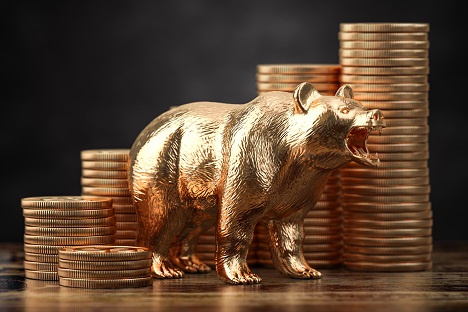“I’m not buying stocks right now. I’m going to wait until the bottom.”
That’s what my friend told me the other day when we were discussing the current market.
I asked him how he’ll know when we’ve hit the bottom. He replied, “When stocks go higher.” I pressed him. “Does that mean you’ll wait for a week, a month, a year?” He didn’t have an answer, but he was confident he’d know the bottom when he saw it.
Many other investors believe they’ll know it when they see it too. But the truth is that no one can know the markets have bottomed until after the fact. Then they look back and declare, “Yeah, that was the bottom.”
Many investors are like my friend in another way. They’re scared of putting money into the market right now. That’s completely understandable.
Investors’ scars from the Great Recession had finally been healing, and now we’ve been smacked with a big sell-off. We had been enjoying our newfound freedom from COVID-19 and a white-hot economy. Now inflation has surged, and it has made life more difficult for a great many people. That, along with action from the Fed, threatens to bring economic growth to a halt.
And it feels different from the mortgage meltdown of 2008. The economic threats were more dire then. We were legitimately facing a potential collapse of the financial system. But while politicians on opposite sides of the aisle weren’t necessarily “singing Kumbaya” together, they did work with each other to try to keep the system from going over the cliff.
Today, it seems like no matter what one side proposes, the other side will vote it down, regardless of its merit – simply because of an “R” or a “D” after their name. Our senators and representatives are interested only in taking sides, and it’s not the side of the American people.
So when we face economic hardship like we’re starting to see now, it feels like we’re in it by ourselves. It’s a lonely, scary feeling.
The good news is that feelings aren’t facts. You’re not in this alone.
Understand that everyone feels this way right now. The conversations I’m having with a wide range of people – from those who are worried about stretching their paychecks to meet their basic needs to those who are extremely wealthy – show they’re all worried about the economy and the market. And almost no one is putting money into the market just yet. Like my friend, they’re all waiting for the bottom.
So what can you do to feel better? There are a few things to remember:
- Like I said, you’re not alone. Everyone is feeling this way. And while Washington may add to your stress, there are plenty of resources at your disposal that can help you get through this. We here at Wealthy Retirement are doing everything in our power to shed light on what’s happening in the economy and the markets and, furthermore, what you can do to protect and continue to grow your wealth.If you have a good financial advisor, talk to them and ask what, if anything, you should be doing differently.
- While the circumstances of each bear market always vary and every one feels different, they’re generally very similar (from an investing standpoint). Bear markets and recessions happen regularly. They’re not fun while you’re going through them, but they generally don’t last long. On average, bear markets last about nine months. That’s it. Think of them like difficult conversations you’ve had in your life, like when you broke up with someone or had to deliver painful news. It’s awful thinking about it and living through it, but then it’s over, and you move on.Remember how horrible the bear market was from 2007 to 2009 – and then how amazing the market was for the following 12 years? Or how shocking and painful the COVID-19 crash was in 2020, only to be followed by a year and a half of stellar gains?
Think about this: In 2020, after the market fell 35% in a matter of weeks, it recouped its losses within five months and went on to gain 32% in a year (and 104% from the bottom). And that was after an attempted overthrow of the U.S. presidential election and a global economic shutdown caused by the biggest pandemic in a century.
We’ll get through this.
- Invest when it feels most uncomfortable to do so. Markets bottom once people panic, capitulate and finish selling off in a mass. I don’t think we’re at that point quite yet, but people are very scared.If you had put money to work near a bottom at any point in history, you would have done extraordinarily well. And believe me, anyone who’s done so wasn’t confident about it at the time. But students of history know that, over the long term, their investments will be fine. But short term, when markets are falling, that’s a tough thing to do – even though it’s the right thing. Force yourself to buy some stocks (even just a little) when markets are tanking. Your future self and your family will thank you and marvel at your nerves of steel (even though the experience will be gut-wrenching at the time).
This is not an easy time, especially for investors. Remember that there are resources and people who can help you, that we’re all feeling the anxiety, and that there is money to be made if you can push yourself out of your comfort zone.
Good investing,
Marc
